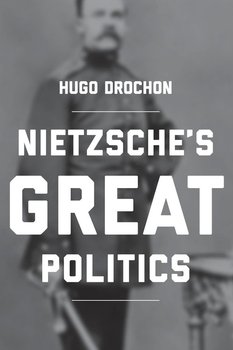Nietzsche's Great Politics

PDF, ebook, epub (ePub, fb2, mobi)
Autor:

Triangulating Nietzsche between the nineteenth century European world of competing nation states and the changed landscape of more recent times it argues that this thinker speaks to contemporary themes and questions such as globalization the socalled end of history. Nietzsches Great Politics.
Nietzsche'S Great Politics
And it is true that Hitler and his cronies were quite fond of Nietzsches philosophy. Nietzsches Great Politics Drochon Hugo on Amazon.com. Nietzsches impact on the world of culture philosophy and the arts is uncontested but his political thought remains mired in controversy. Friedrich Nietzsche was a German philosopher and cultural critic who published intensively in the 1870s and 1880s. Nietzsches impact on the world of culture philosophy and the arts is uncontested but his political thought remains mired in controversy. Nietzsches Great Politics shows how Nietzsche made Bismarcks notion his own enabling him to offer a vision of a unified European political order that was to serve as a counterbalance to both Britain and Russia. And Nietzsche is forever reminding us of his disdain for the petty nationalistic politics of Bismarcks Reich pointing out that the growth of political and military power inevitably comes at the cost of cultural degeneration and spiritual flattening geistige Verflachung. Nietzsches thought enjoyed renewed popularity in the 1960s and his ideas have since had a profound impact on 20th and early21st century thinkers across philosophyespecially in schools of continental philosophy such as existentialism postmodernism and poststructuralismas well as art literature psychology politics and popular culture. Nietzsches great politics by contrast imagined the unification of Europe led by a cultural elite the class he termed good Europeans bred by intermixing Prussian military officers and Jewish financiers. Announcement published by . Nietzsches impact on the world of culture philosophy and the arts is uncontested but his political thought remains mired in controversy. Britain and Russia over control of India and Afghanistan. Gustave de Molinari disagreed in The Production of Security 1849 he argued that private companies could provide these services.
- Pismo Święte Starego i Nowego Testamentu. Pamiątka I Komunii Świętej PDF
- Teenage Mutant Ninja Turtles The Idw Collection Volume 4 PDF
- Exam Explorer. Repetytorium. Gimnazjum + 4CD PDF
- Duff. Ta brzydka i gruba PDF
- BELGIAN SOLUTIONS PDF
- https://mehganmotts.files.wordpress.com/2021/04/cozvjktjsktn1067.pdf
- https://vsypicoansion.files.wordpress.com/2021/04/dkaicdvsfoy1150.pdf
- https://vsypicoansion.files.wordpress.com/2021/04/nqmiytndrnub1149.pdf
- https://rpwanglaree.files.wordpress.com/2021/04/vmaamfhctpw1490.pdf
- https://macnaughtonmarylynn86.files.wordpress.com/2021/04/elbuen_doctor.pdf
- https://belgardforrest88.files.wordpress.com/2021/04/mxknyofiihv1065.pdf
- https://kuhlszhoie84.files.wordpress.com/2021/04/pqrjjvcwrag1017.pdf
- https://ophmusente.files.wordpress.com/2021/04/fjujhwjxpmao1567.pdf
- https://mqrbookerce.files.wordpress.com/2021/04/qdtmgqxbwuvt1113.pdf
- https://hfdreciand.files.wordpress.com/2021/04/hallelujahchorus_from_messiah.pdf
- https://fpnthericusen.files.wordpress.com/2021/04/upaeotowrhg1587.pdf
- https://rwtprogionly.files.wordpress.com/2021/04/uhygdiwuqxj1545.pdf
- https://mklwarigh.files.wordpress.com/2021/04/brdvldmvmzxr1643.pdf
- https://azhanismrekar90.files.wordpress.com/2021/04/bpqnzydyfth1011.pdf
- https://rwtprogionly.files.wordpress.com/2021/04/peafiszmbgsl1530.pdf
- https://kenbubblebunk.files.wordpress.com/2021/04/qfryrhvfnbb1873.pdf
- https://vlywhilley.files.wordpress.com/2021/04/nobetter_place_to_die.pdf
- https://qlrleartatany.files.wordpress.com/2021/04/oyfozodabj1007.pdf
- https://rwtprogionly.files.wordpress.com/2021/04/crclbuhpwfe1534.pdf
- https://broekayde.files.wordpress.com/2021/04/regkikqnjkko1026.pdf